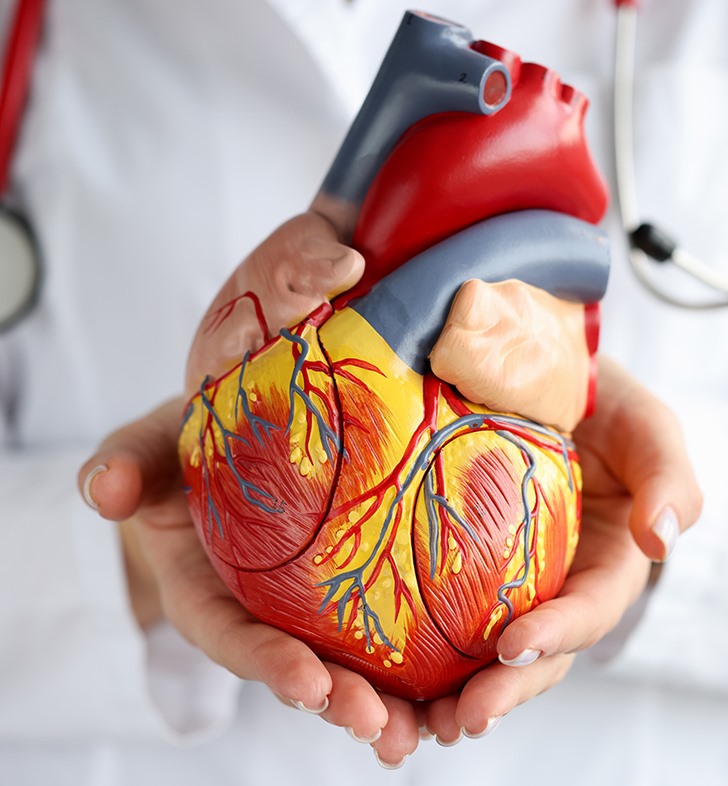
Atrial Arrhythmia
What causes atrial arrhythmia?
Atrial arrhythmias result from
abnormal electrical signals. These signals, or impulses, start in the atria.
The abnormal impulses can be inherited (passed down through families) or result
from several health problems or heart conditions, including:
Anemia (low red blood cell count).
Cardiomyopathy, a disease of the
heart muscle.
Diabetes.
Heart attack or damage from a
previous heart attack.
Heart disease, coronary artery
disease (CAD) and heart failure.
High blood pressure (hypertension).
Lung conditions such as chronic
obstructive pulmonary disease (COPD).
Structural heart problems, including
valve disease.
Thyroid problems, including
hyperthyroidism.
Atrial arrhythmias can also develop
as a result of lifestyle factors:
Dehydration.
Drinks and foods that contain
caffeine. Foods that are high in fat, sugar or carbohydrates can cause heart palpitations
after eating.
Drug use, including nasal
decongestants that contain pseudoephedrine.
Excessive alcohol.
Having extra weight and obesity.
High levels of anxiety and stress.
Hormonal changes, including those
that happen during menopause or pregnancy. Heart palpitations during pregnancy
are very common and usually harmless.
Smoking and using tobacco products.
What are the symptoms of atrial
arrhythmia?
Symptoms of atrial arrhythmia
include:
A heartbeat that’s fast and regular.
It may feel like your heart is racing.
An irregular heartbeat. You may feel
like it skipped a beat, stopped for a minute, sped up or slowed down.
Chest pain, discomfort or tightness
in the chest.
Difficulty breathing or shortness of
breath.
Dizziness or confusion.
Fainting (syncope) or loss of
consciousness.
Fatigue or feeling sluggish.
Fluttering or pounding in your
chest, throat or neck (heart palpitations).
Swelling (edema) in your limbs,
especially your legs, ankles and feet.
How are atrial arrhythmias
diagnosed?
After asking about your symptoms and
listening to your heart, your provider will recommend a blood test (complete
blood count or CBC). A blood test looks for anemia, vitamin deficiencies or a
problem with your thyroid.
Your provider will do a test called
an electrocardiogram (EKG or ECG). This test monitors your heart rate using
sensors that attach to your skin. You get this test in your provider’s office.
It takes about 15 minutes.
If the EKG doesn’t detect an irregular
heartbeat, your provider may recommend an ambulatory monitor such as a Holter
monitor. This device is portable and you wear it for about a week. It records
your heart rate and any irregular heartbeats.
How do providers treat atrial
arrhythmias?
If you have an arrhythmia, you’ll
see a heart specialist called a cardiologist. Your cardiologist will recommend
treatment based on your overall health and the type of arrhythmia. Many
arrhythmias get better with lifestyle and dietary changes, such as:
Avoiding alcohol, caffeine and some
types of medications, such as cold medications and nasal decongestants that
include pseudoephedrine.
Drinking plenty of water to avoid
dehydration.
Getting help for anxiety and doing
relaxation exercises and deep breathing to lower stress levels.
Losing weight and maintaining a
healthy weight if you are obese.
Quitting smoking and using tobacco
products.
Some arrhythmias require treatments
in addition to lifestyle changes. If you have more than one type of arrhythmia,
you may need several treatments. Atrial arrhythmia treatments include:
Catheter ablation, a minimally
invasive procedure that destroys a bit of the tissue on the inside of the heart
that is sending irregular electrical signals and causing arrhythmia.
Devices, such as an implantable
cardioverter-defibrillator (ICD), subcutaneous ICD or pacemaker.
Electrical cardioversion, a
procedure that delivers safe jolts of energy to your heart and disrupts the
abnormal rhythm back to a normal rhythm.
Medications, including arrhythmia
medications to make your heart rhythm regular or prevent heartbeat
irregularities. Other drugs, such as blood thinners, reduce your risk of stroke
from Afib.
How can I reduce my risk of atrial
arrhythmia?
You may not be able to prevent
atrial arrhythmia, but you can lower your risk by staying healthy and making
smart choices. These include:
Following a diet that’s good for
your heart.
Getting plenty of exercise and
staying active.
Losing weight and maintaining a healthy
weight if you have obesity.
Lowering your blood pressure if you
have hypertension.
Managing cholesterol
Talking to your provider about a
plan to quit smoking and using tobacco.
If you have a heart condition or
health problem that puts you at an increased risk, talk to your provider. They
will give you specific information about other steps you can take to lower your
chance of developing arrhythmia.
What can I expect if I have atrial
arrhythmia?
The outlook for people with atrial
arrhythmias depends on several factors, including the type of arrhythmia and
your overall health. Many people relieve symptoms with lifestyle and dietary
changes. Treatments for atrial arrhythmias can help you live a healthier life
overall. See your provider regularly so they can monitor your heart health and
work with you to feel your best.